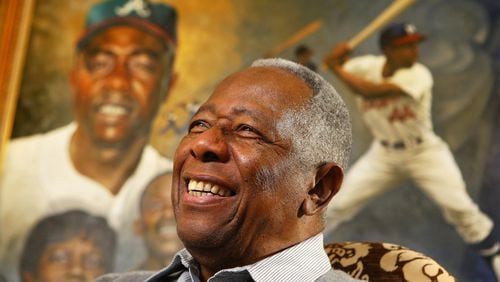On April 8, 1974, Hank Aaron, the owner of the greatest pair of wrists in American history, stepped to the dish at Atlanta-Fulton County Stadium and did what Hank Aaron had done so many times before: lined a rocket over the left field wall. The difference here, of course, was that said rocket was home run number 715, toppling one George Herman “Babe” Ruth from his pedestal as the all-time long ball champion.
What ought to have been a joyous advance toward America’s most hallowed sports record instead became a nightmare for Aaron. He received death threats from people who wouldn’t have cared less save for the color of this great man’s skin.
We often speak — and rightfully so — of Jackie Robinson as baseball’s ultimate courageous pioneer. I believe that if Robinson had had a single at-bat and tapped back to the pitcher, his place in Cooperstown would still be deserved.
But imagine what it must have been like to be the vaunted Hammer, a player who had dominated a sport for 20 years, with no let up, facing these racial attacks, most intense near the end of his career. It was as if the nightmare had run in reverse.
I recently perused the comments in a baseball history forum about why Aaron has never been looked at as the sport’s best player. His game is actually underrated. You could even argue that there is no one who is more so when you parse what he achieved.
One answer is simple: There were few players — fewer than five — who were better. But no one else has beaten Aaron at providing value.
Aaron was more than a ballplayer, and his legacy is especially useful now, when superfluousness dominates.
Credit: handout
Credit: handout
Think about how rarely people ever seem to ask themselves, “What is the value in what I’m doing?” You read a book, and you might wonder, “What is the point of this? What is the actual value?”
Value isn’t about ego or racking up social media plaudits. Value is an absolute. Value is always productive, never reductive. Value is a maxing out. And no one has ever maxed out a ballfield like Aaron.
Just about every baseball nut will tell you that Aaron was no Willie Mays, but they have it the wrong way round: Aaron was better — at least as a hitter.
Most players have a prime and a peak. Aaron didn’t. His entire career until that 1974 season — when Father Time started doing his annoying song and dance — was peak.
Mays was awesome from 1954 to 1966. That’s 13 years. Aaron, meanwhile, was awesome from 1955 to 1973. Nineteen years. No sags in the road. A perpetually fulfilled standard of excellence.
We should endeavor to be like the Hammer no matter what we do. Locate purpose, then deliver worthwhile good to the best of our abilities. Fill up life’s stat sheet.
I’ve heard the complaints that Aaron never popped 50 home runs in a season. He slugged around 30 to 40 every year, which is a lot better than bashing 52 and falling off to 21.
Ruth needed brawn; Aaron did not. I’ve always thought there was something bordering on the philosophical in what Aaron’s wrists could do. No batter could let the ball get deeper on him than Aaron, who, having sized up what was on offer or what manner of deception had been attempted, could then flick those wrists, and there she went. He didn’t hit moonshot home runs. There was a sweet efficiency in his liners that left the yard in three seconds, tops.
Having never met anyone who considers the Barry Bonds — come on — the real home run champ, I encourage baseball fans to think a bit more about Hank Aaron as value king. Consider those year in, year out numbers. Celebrate the brilliant purpose of it all.
That night in 1974 was more than a coronation. It was Hank Aaron delivering the goods, in baseball and in life. We’re talking stats and something more than stats. No one embodied that fulfilled ideal better than the relentless Hammer, model of excellence to us all.
Colin Fleming, the author of eight books, has written for the Atlantic, Harper’s, Sports Illustrated, the New Yorker, Time, USA Today, the Wall Street Journal and Chicago Tribune, among others.







